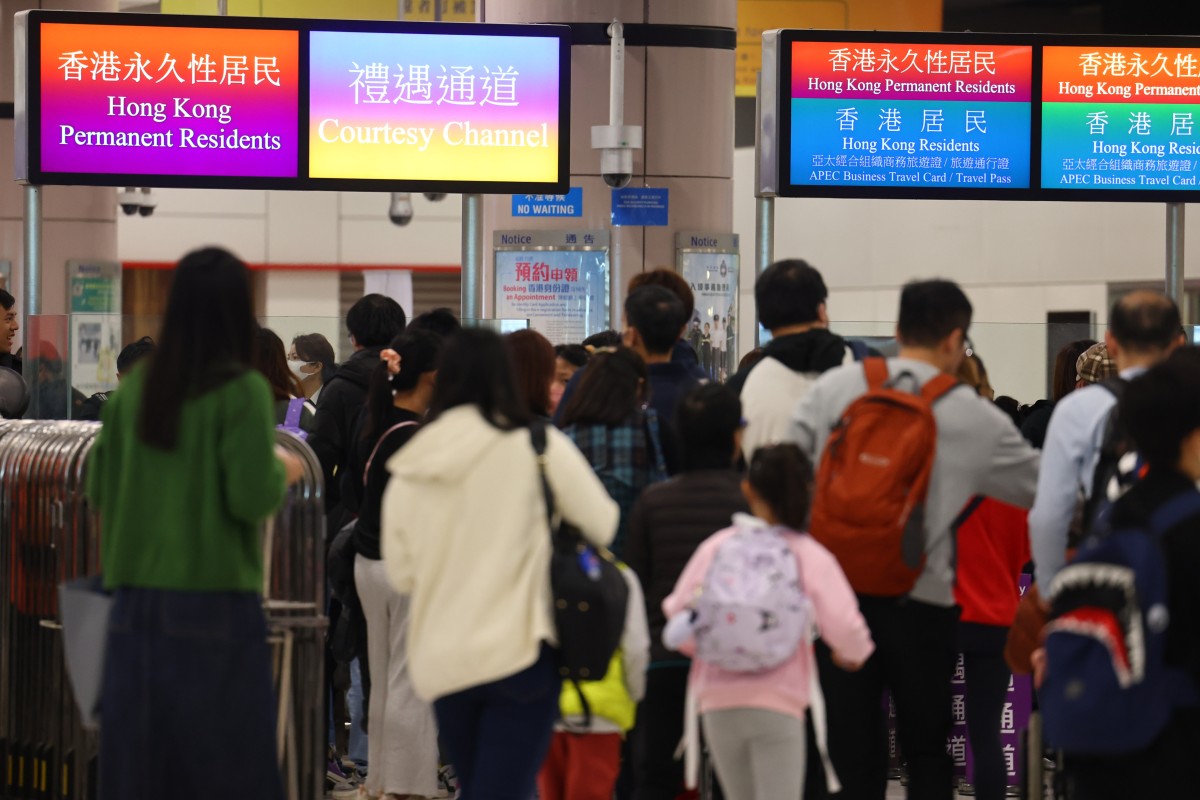 Beijing will now offer five-year multi-entry travel permits to non-Chinese permanent residents in Hong Kong. Photo: Dickson Lee
Beijing will now offer five-year multi-entry travel permits to non-Chinese permanent residents in Hong Kong. Photo: Dickson LeeBeijing will now offer five-year multi-entry travel permits to non-Chinese permanent residents in Hong Kong. Expatriates and foreign chambers have welcomed this move because it will help strengthen the city’s international status.
They said they hoped authorities would expand the permit’s scope to cover non-permanent residents holding foreign passports, to maximise the move’s effect on attracting global talent to Hong Kong. About 270,000 adult permanent residents are set to benefit from the new permit.
Apply for permits starting on July 10
It was on Monday that the National Immigration Administration announced that non-Chinese permanent residents of Hong Kong and Macau, regardless of their nationality and occupation, would be able to apply for the permits to enter mainland China starting on July 10.
Holders of the multi-entry permits will also enjoy self-service clearance at control points once they complete procedures such as having their fingerprints taken.
Permit holders can enter the mainland for short-term purposes, such as investment, visiting relatives, tourism, business, seminars and exchanges. They may stay up to 90 days per visit but are barred from working, studying or engaging in newsgathering activities.
Under the new permit, eligible residents may apply through China Travel Service (Holdings) in both Hong Kong and Macau. Permits will be issued within 20 working days if their applications are successful.
An application will cost HK$260 (US$34), while people seeking to renew or replace permits on the mainland will have to pay 230 yuan (US$32), the administration said.
Currently, most non-Chinese permanent residents need to apply for separate visas to visit the mainland.
They are also required to use the manual channels at mainland ports of entry and provide fingerprints and fill out entry cards each time.
Hong Kong climbs to No 50 spot in global liveability ranking, Singapore 26th
How foreign chambers are reacting
The American Chamber of Commerce in Hong Kong said the business community “welcomed and appreciated” the government’s recognition of the importance of enhancing cross border connectivity between Hong Kong and the mainland.
“This will not only make travelling easier and more convenient for expats in Hong Kong who have business interests in the Greater Bay Area, but also reinforce the strategic value of Hong Kong as a gateway for international businesses to invest in and learn more about the mainland,” a chamber spokesman said.
Inaki Amate, chairman of the European Chamber of Commerce in Hong Kong, said he perceived the measure as an answer to the group’s requests for more cross-border convenience.
Johannes Hack, president of the city’s German Chamber of Commerce, said it was a step in the right direction but further enhancements were needed.
“To attract new foreign businesspeople to Hong Kong, the measure would need to be extended to non-permanent residents too, because these [people] could then be attracted by ‘living in Hong Kong while working on the mainland but commuting like you’re in Europe’,” Hack said.
Hack’s remarks were echoed by business magnate Allan Zeman, who pointed to the longer time foreign employees took to go through customs clearance and the additional documents needed for entering the mainland.
“We need a lot of game changers at the moment. This is definitely a good move to keep Hong Kong’s international status and its edge,” Zeman said.
He also added that moving forward, authorities should consider including non-Chinese non-permanent Hong Kong residents in the measure for Hong Kong to better integrate into the Greater Bay Area.
Why the government is issuing these permits
The central government said it decided to issue the permits to further facilitate people-to-people exchanges between Hong Kong, Macau and the mainland, and to help both cities better integrate into overall national development.
Chief Executive John Lee Ka-chiu said the new policy, announced on the 27th anniversary of the city’s return to Chinese rule, “demonstrated our country’s care and support” for Hong Kong.
Lee said many non-Chinese permanent residents had deep roots in Hong Kong, while those working in the city had been particularly keen on seizing the historic opportunities of the country’s rapid developments.
“We firmly believe that international talent of Hong Kong companies can enjoy the long-awaited clearance convenience for northbound travel with this permit,” he said.
The absence of any limits on nationality or occupation of the permit also “fully highlights Hong Kong’s unique status under ‘one country, two systems’ and greatly helps the city maintain its international character and diversity, thereby providing a significant incentive for companies and talent from around the world to settle in”, Lee added.
The new travel permit is among a string of more liberal visa measures Beijing has granted to Hong Kong since early 2023.
Others include launching and expanding the Greater Bay Area exit endorsement for talent in Beijing and Shanghai, extending the duration of stay of business visits in Hong Kong from seven days to 14 days, and introducing multiple-entry “northbound” visas for foreign employees working in the city.
As of June, about 270,000 non-Chinese people held permanent identity cards, with children aged under 11 years excluded.
